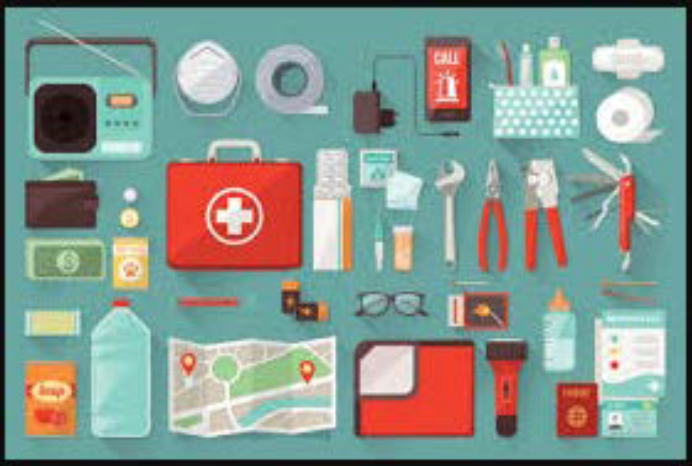Be Prepared for Power Outages
Extended power outages can occur from time to time due to accidents, weather or unexpected system damage. You can greatly reduce the impact of a power failure by ensuring your family is prepared in advance.
Find out what to do before, during and after a power failure at www.GetPrepared.ca
Get live outage updates on our outage map and on Twitter @GrimsbyPower
Prepare for an Outage: Build a Basic 72 hour Emergency Kit
Should a long-term outage occur, ensure that your family has a kit that will last at least 72 hours or until power is restored. The following is a list of essentials that an emergency kit should include:
Basic emergency kit
- Water - at least two litres of water per person per day. Include small bottles that can be carried easily in case of an evacuation order
- Food that won’t spoil, such as canned food, energy bars and dried foods (remember to replace the food and water once a year)
- Manual can opener
- Wind-up or battery-powered flashlight (and extra batteries)
- Wind-up or battery-powered radio (and extra batteries)
- First aid kit
- Special items such as prescription medications, infant formula and equipment for people with disabilities
- Extra keys to your car and house
- Cash in smaller bills, such as $10 bills (travellers cheques are also useful) and change for payphones
- A copy of your emergency plan and contact information
Tip: You may want to ensure you have a land-line and corded phone in your home, as most cordless phones will not work during a power outage.
Recommended additional items
- Candles and matches or lighter (do not leave candles unattended. Place candles in sturdy containers and put them out before going to sleep)
- A change of clothing and footwear for each household member
- Sleeping bag or warm blanket for each household member
- A whistle (in case you need to attract attention)
- Garbage bags for personal sanitation
- Toilet paper and other personal care supplies
- Safety gloves
- Basic tools (hammer, pliers, wrench, screwdrivers, fasteners, safety gloves)
- Small fuel-driven stove and fuel (follow manufacturer’s directions and store properly)
- Two extra litres of water per person per day for cooking and cleaning.
During a Power Failure
A power outage may cause disruption to communication and transportation services, business closures including grocery stores, gas stations and bank machines, food spoilage and water contamination and medical device failure.
What to do during a power failure:
- First, check whether the power outage is limited to your home. If your neighbours’ power is still on, check your own circuit breaker panel or fuse box. If the problem is not a breaker or a fuse, check the service wires leading to the house. If they are obviously damaged or on the ground, stay at least 10 meters back and notify your electric supply authority. Keep the number along with other emergency numbers near your telephone.
- If your neighbors' power is also out, notify your electric supply authority.
- Turn off all tools, appliances and electronic equipment, and turn the thermostat(s) for the home heating system down to minimum to prevent damage from a power surge when power is restored. Also, power can be restored more easily when there is not a heavy load on the electrical system.
- Turn off all lights, except one inside and one outside, so that both you and hydro crews outside know that power has been restored.
- Don’t open your freezer or fridge unless it is absolutely necessary. A full freezer will keep food frozen for 24 to 36 hours if the door remains closed.
- Never use charcoal or gas barbecues, camping heating equipment, or home generators indoors. They give off carbon monoxide. Because you can’t smell or see it, carbon monoxide can cause health problems and is life-threatening.
- Use proper candle holders. Never leave lit candles unattended and keep out of reach of children. Always extinguish candles before going to bed.
- Listen to your battery-powered or crank radio for information on the outage and advice from authorities.
- Make sure your home has a working carbon monoxide detector. If it is hard-wired to the house’s electrical supply, ensure it has a battery-powered back-up.
- Protect sensitive electrical appliances such as TVs, computer, and DVD players with a surge-protecting powerbar.
Source: Government of Canada - Get Prepared
After a Power Failure
- Reset your clocks, automatic timers, and alarms.
- Restock your emergency kit.
Food Safety during a Power Outage:
- Keep freezer and refrigerator doors closed!
- A full freezer will keep food frozen for about 48 hours.
- An un-opened refrigerator will keep food cold for approximately 4 hours.
- If required, add ice to the refrigerator should the power remain out for an extended period of time.
- Do not put frozen food outside - even in the snow. Sun exposure and potential contamination from animals and pollutants can occur.
- Throw-out any food that has been in room temperature for two or more hours, and any food with changes to colour and/or odour. Change in odour or colour is not a definite factor to determine if food has spoilt so when in doubt, throw it out!
For more information on food safety during a power outage visit the Canadian Food Inspection Agency
